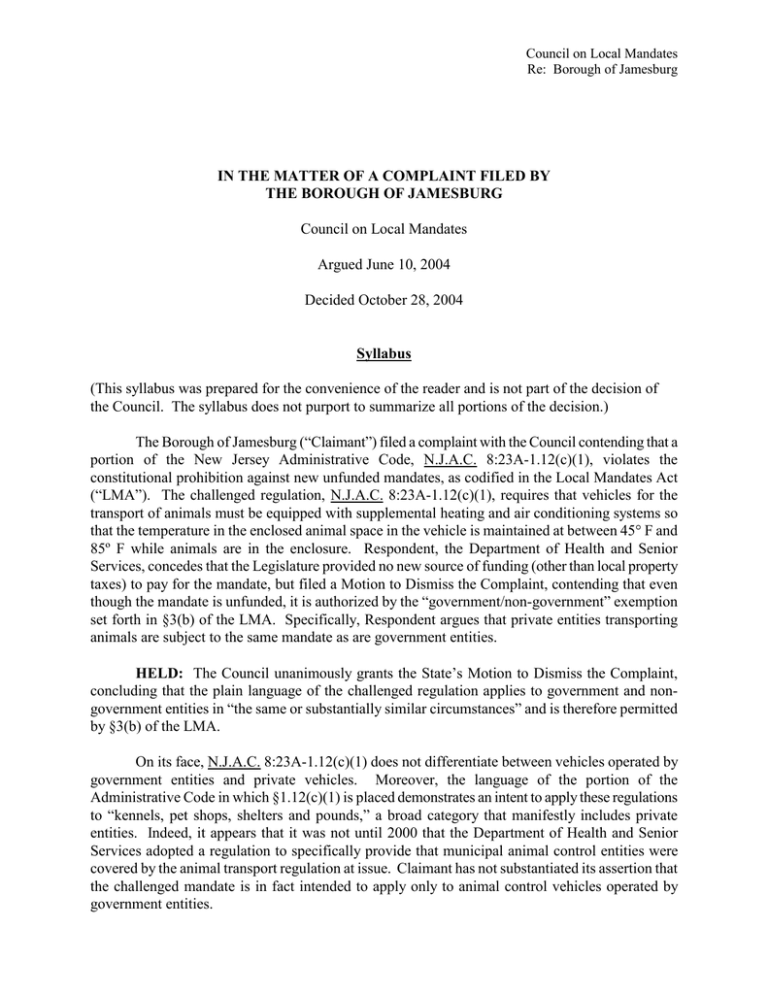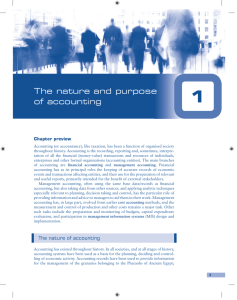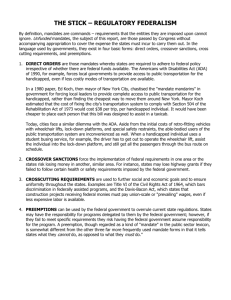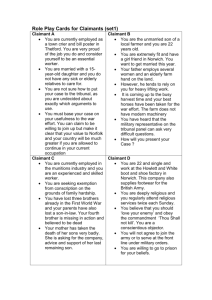Council on Local Mandates Argued June 10, 2004 Decided October 28, 2004
advertisement

Council on Local Mandates Re: Borough of Jamesburg IN THE MATTER OF A COMPLAINT FILED BY THE BOROUGH OF JAMESBURG Council on Local Mandates Argued June 10, 2004 Decided October 28, 2004 Syllabus (This syllabus was prepared for the convenience of the reader and is not part of the decision of the Council. The syllabus does not purport to summarize all portions of the decision.) The Borough of Jamesburg (“Claimant”) filed a complaint with the Council contending that a portion of the New Jersey Administrative Code, N.J.A.C. 8:23A-1.12(c)(1), violates the constitutional prohibition against new unfunded mandates, as codified in the Local Mandates Act (“LMA”). The challenged regulation, N.J.A.C. 8:23A-1.12(c)(1), requires that vehicles for the transport of animals must be equipped with supplemental heating and air conditioning systems so that the temperature in the enclosed animal space in the vehicle is maintained at between 45° F and 85º F while animals are in the enclosure. Respondent, the Department of Health and Senior Services, concedes that the Legislature provided no new source of funding (other than local property taxes) to pay for the mandate, but filed a Motion to Dismiss the Complaint, contending that even though the mandate is unfunded, it is authorized by the “government/non-government” exemption set forth in §3(b) of the LMA. Specifically, Respondent argues that private entities transporting animals are subject to the same mandate as are government entities. HELD: The Council unanimously grants the State’s Motion to Dismiss the Complaint, concluding that the plain language of the challenged regulation applies to government and nongovernment entities in “the same or substantially similar circumstances” and is therefore permitted by §3(b) of the LMA. On its face, N.J.A.C. 8:23A-1.12(c)(1) does not differentiate between vehicles operated by government entities and private vehicles. Moreover, the language of the portion of the Administrative Code in which §1.12(c)(1) is placed demonstrates an intent to apply these regulations to “kennels, pet shops, shelters and pounds,” a broad category that manifestly includes private entities. Indeed, it appears that it was not until 2000 that the Department of Health and Senior Services adopted a regulation to specifically provide that municipal animal control entities were covered by the animal transport regulation at issue. Claimant has not substantiated its assertion that the challenged mandate is in fact intended to apply only to animal control vehicles operated by government entities. Council on Local Mandates Re: Borough of Jamesburg October 28, 2004 Page 2 ____________ Frederick C. Raffetto argued the cause for Claimant Borough of Jamesburg (Ansell Zaro Grimm & Aaron, attorneys; Mr. Raffetto on the brief). Michael J. Kennedy, Deputy Attorney General, argued the cause for Respondent Department of Health and Senior Services (Peter C. Harvey, Attorney General of New Jersey, attorney; Mr. Kennedy on the briefs). William John Kearns, Jr. argued the cause for amicus curiae New Jersey State League of Municipalities (Kearns, Vassallo & Kearns, attorneys; Mr. Kearns on the brief). Council on Local Mandates Re: Borough of Jamesburg October 28, 2004 Page 3 DECISION Claimant Borough of Jamesburg filed a Complaint with the Council on Local Mandates on February 2, 2004, demanding judgment that a provision of the New Jersey Administrative Code, N.J.A.C. 8:23A-1.12(c)(1), constitutes an unfunded mandate in violation of the New Jersey Constitution, Art. VIII, §2, ¶5, as implemented by the Local Mandates Act, N.J.S.A. 52:13H-1 through -22. The challenged regulation, N.J.A.C. 8:23A-1.12(c)(1), requires that certain vehicles for the transport of animals must be equipped with supplemental heating and air conditioning systems so that the temperature in the enclosed animal space in the vehicle is maintained at between 45° F and 85º F while animals are in the enclosure. By letter dated February 25, 2004, the Council required the Commissioner of Health and Senior Services to answer the Complaint, as Respondent, and to file any motion directed to the Complaint, on or before March 16, 2004. On March 15, 2004, Respondent Department of Health and Senior Services filed an Answer and a Motion to Dismiss the Complaint. By letter of March 25, 2004, the New Jersey State League of Municipalities (“State League”) requested leave to appear as amicus curiae. The Council approved the request on April 12, 2004. After briefing by Claimant, Respondent and amicus curiae State League, oral argument was held on June 10, 2004. I Constitutional and Statutory Background Article VIII, §2, ¶5 of the New Jersey Constitution (“Amendment”) applies to any provision of a law enacted on or after January 17, 1996, and to any rule or regulation issued pursuant to a law originally adopted after July 1, 1996. The Amendment provides that any such law, rule or regulation, Council on Local Mandates Re: Borough of Jamesburg October 28, 2004 Page 4 or portion thereof, that is determined by the Council to be an unfunded mandate shall cease to be mandatory in its effect and shall expire. See N.J. Const. art. VIII, §2, ¶5(a). The Legislature adopted the Local Mandates Act, N.J.S.A. 52:13H-1 et seq. (“LMA”), to implement the provisions of the Amendment, effective May 8, 1996. The portion of the regulation challenged by Claimant as an unfunded mandate, N.J.A.C. 8:23A-1.12(c)(1), was adopted by the Department of Health and Senior Services (“Department”) effective March 20, 2000. Because the challenged provision came into force after the dates specified in the Amendment, ¶5(a), it is subject to the LMA and within the jurisdiction of the Council. Respondent does not question the Council’s jurisdiction or Claimant’s standing to challenge the regulation under the LMA. N.J.A.C. 8:23A-1.12(c)(1) provides as follows (the challenged portion of the regulation being italicized): (c) Primary enclosures used to transport animals, such as compartments or transport cages, cartons or crates, shall be wellconstructed and well-ventilated and designed to protect the health and insure the safety of the animals. Such enclosures shall be constructed or positioned in the vehicle in such a manner that: 1. Each animal in the vehicle has access to sufficient fresh air for normal breathing and ventilation is sufficient to prevent the onset of heat prostration. The temperature within such enclosures shall not be allowed to exceed 85 degrees Fahrenheit or fall below 45 degrees for a period of more than two hours, provided, however, that at no time may an animal be transported for longer than one hour at a temperature of more than 95 degrees Fahrenheit or less than 35 degrees Fahrenheit. Vehicles which are purchased after March 20, 2000 shall be equipped with supplementary air conditioning and heating to maintain the temperature within the enclosures between 85 degrees Fahrenheit and 45 degrees Fahrenheit at all times when animals are in the enclosures. (Four years from the effective date of these rules, all vehicles shall be equipped with supplementary air conditioning and heating to maintain the temperature within the enclosures between 85 degrees Fahrenheit and 45 degrees Fahrenheit at all times when animals are in the enclosures. Council on Local Mandates Re: Borough of Jamesburg October 28, 2004 Page 5 To make out a claim of unconstitutionality under the Amendment and the LMA the Claimants must satisfy the following three requirements: First, that the statute, rule or regulation imposes a “mandate” on a unit of local government; Second, that “additional direct expenditures [are] required for the implementation of the law or rule or regulation . . .;” and Third, that the statute, rule or regulation fails to “authorize resources, other than the property tax, to offset the additional direct expenditures.” Amendment, ¶5(a); see also In re Ocean Township (Monmouth County) and Frankford Township (“Ocean/Frankford”) (August 2, 2002) at 5. II The Section 3 Exemption At oral argument, Respondent conceded that the challenged provision of N.J.A.C. 8:23A1.12(c)(1) imposes a mandate and that “additional direct expenditures” are required for its implementation. Claimant maintains, without opposition, that neither the regulation nor the statutes authorizing adoption of the regulation authorize resources (other than the property tax) to offset the expenditures required to defray the additional cost of equipping vehicles with the required climate control devices. Respondent’s argument in support of N.J.A.C. 8:23A-1.12(c)(1), and the dispositive issue for purpose of resolving the Complaint, is that because the animal transport mandate applies to both government and non-government entities, it is permitted by N.J.S.A. 52:13H-3(b) of the Local Mandates Act (hereafter §3(b)) as an exemption to the “State mandate, State pay” principle of the Constitution. Council on Local Mandates Re: Borough of Jamesburg October 28, 2004 Page 6 III The Motion to Dismiss Respondent raises the §3(b) defense by way of a Motion to Dismiss. The standard for summary disposition of Complaints, whether by Motion to Dismiss or Summary Judgment, was first addressed by the Council in In re Board of Education of the Borough of Highland Park (“Highland Park I”), decided August 5, 1999, and reaffirmed in Ocean/Frankford. Requests for summary disposition are to be reviewed “with great caution,” Highland Park I at 13, because decisions of the Council are final. Such a request can be granted “only if the Council concludes that no further factual information would be relevant to its decision.” Ocean/Frankford at 5. The Council concludes that both the Complaint and the Motion to Dismiss raise issues of textual interpretation of the challenged regulation, and that “no further factual information” is needed to resolve those issues. For the reasons set forth herein, the Council finds and concludes that N.J.A.C. 8:23A-1.12(c)(1) applies to both government and non-government entities as provided in §3(b) of the Local Mandates Act and, therefore, it does not violate the New Jersey Constitution, art. VIII, §2, ¶5, as implemented by the LMA. Accordingly, Respondent’s Motion to Dismiss is granted and Claimant’s demand for judgment is denied. IV The Government/Non-Government Exemption To establish the animal transport regulation as a §3(b) exemption to the State constitutional prohibition on unfunded mandates, Respondent must demonstrate that the unfunded mandate is imposed on both government and non-government entities in “the same or substantially similar circumstances.” Council on Local Mandates Re: Borough of Jamesburg October 28, 2004 Page 7 On its face, N.J.A.C. 8:23A-1.12(c)(1) does not differentiate between vehicles operated by government entities and those operated by non-government ones. It applies across the board to any vehicle used to transport animals by entities within the scope of the regulation. Moreover, the subchapter of the New Jersey Administrative Code within which N.J.A.C. 8:23A-1.12(c)(1) is located, Subchapter 1 of Chapter 23A, is titled “Sanitary Operation of Kennels, Pet Shops, Shelters and Pounds,” a category that manifestly includes non-government entities. N.J.A.C. 8:23A-1.1, the definitions section of this subchapter, further makes clear that non-government entities are subject to its provisions. “Pet shop,” for instance, is defined as “any place of business which is not part of a kennel, wherein animals . . . are kept or displayed chiefly for the purpose of sale to individuals for personal appreciation and companionship rather than for business or research purposes.” Id. (emphasis added). It is self-evident that governments do not operate pet shops, an activity confined to the private sector.1 Even more pointedly, the definition of “Pound” evidences the Department’s intent that the provisions of this subchapter, including N.J.A.C. 8:23A-1.12(c)(1), be applied to both government and non-government entities: “Pound means any establishment [for] the confinement of dogs or other animals seized under the provisions of N.J.S.A. 4:19-15.16 or otherwise.” Id. (emphasis added). N.J.S.A. 4:19-15.16 describes impoundment duties of municipal animal control officers. But the definition of “pound” is not limited by the definition to this category of entity. The definition, and hence the provisions of the subchapter, applies not only to municipal pounds operated pursuant to the animal control function described in N.J.S.A. 4:19-15.16, but also “otherwise,” i.e., to a pound operated by a private entity such as a charitable animal rescue agency. See Society for Animal Rights, Inc. v. Township of Mahwah, 138 N.J. Super. 322 (Law Div. 1975), aff’d. 148 N.J. 1 Similarly, “shelter” is defined as “any establishment where dogs or other animals are Council on Local Mandates Re: Borough of Jamesburg October 28, 2004 Page 8 Super. 249 (App. Div. 1977), certif. den. 75 N.J. 322 (1977). Indeed, it appears that prior to 2000, the Department interpreted N.J.A.C. 8:23A-1.12 to apply primarily to non-government entities. N.J.A.C. 8:23-3.1, adopted as a new regulation in 2000, see 32 N.J.R. 1052(b), 1053 (2000), references N.J.A.C. 8:23A-1.12 and for the first time explicitly makes its provisions applicable to “animal control officers transporting animals under the provisions of N.J.S.A. 4:19-15.16b.” It is immaterial whether there was an unwritten understanding prior to 2000 that animal control officers would comply with these regulations. At the very least, N.J.A.C. 8:23-3.1 clarifies that the regulation challenged before the Council, N.J.A.C. 8:23A-1.12(c)(1), now applies to both government and non-government entities.2 To avoid this reading of N.J.A.C. 8:23A-1.12(c)(1), Claimant Jamesburg and amicus State League assert that the animal control function is exclusively a responsibility of governmental entities; therefore, they argue, the §3(b) exemption cannot apply because there is no non-government entity that exercises this function, as §3(b) requires. In considering this assertion, the Council does not draw any distinction between municipalities that perform the animal control function themselves (as Claimant apparently does) and those that contract with a private entity to perform the service (to which Respondent points in support of its §3(b) argument). Assuming (without deciding) that Claimant is correct, namely, that the animal control function is performed only by municipalities, directly or by contract, and that the challenged mandate applies only to the animal control function, it follows that the cost of providing the service (including any unfunded mandates) will likely be born by taxpayers of the municipality in either case. When performed by a private entity, the cost could received, housed and distributed.” Id. (emphasis added). 2 Claimants do not assert that N.J.A.C. 8:23-3.1, of its own terms, constitutes an unfunded mandate, nor do they make this claim with respect to any of the provisions of N.J.A.C. 8:23A1.12(c)(1) other than the climate control provision for animal transport vehicles. Council on Local Mandates Re: Borough of Jamesburg October 28, 2004 Page 9 be passed by contract back to the municipality, and, if so, the mandate would be actionable under the Amendment and the LMA. Claimant and the State League are not correct, however, in their assertion that the challenged mandate applies only to the animal control function. Rather, the Department has addressed a general concern about the welfare of animals in transport, a subject within its statutory authority. It has imposed its mandate without regard to whether the animal is being transported by a municipal vehicle, by a private animal control vehicle hired by the municipality, by a charitable animal rescue organization, or by a pet shop owner restocking animals for sale.3 Entities in “substantially similar” circumstances – i.e., all public and private kennels, pet shops, shelters and pounds transporting animals for any purpose, as well as animal control vehicles operated by municipalities – are subject to the same mandate. The §3(b) exception therefore applies. VI Conclusion For the reasons given above, Respondent’s Motion to Dismiss is granted and Claimant’s demand for judgment is denied. ***** The above decision was adopted by the Council and issued on October 28, 2004. Council Members Timothy Q. Karcher (Chair), Sam Crane, Marie L. Garibaldi, Sean M. Kennedy, Victor R. McDonald, III, Sy Wane, and Janet L. Whitman join in the written decision. Council Member Geoffrey S. Berman did not participate in the decision. 3 Neither Claimant nor amicus State League has contended that N.J.A.C. 8:23A-1.12(c)(1) does not in fact reach non-government entities, nor has either offered proofs that might contradict the clear text of the regulation. The Council notes, however, that the Department’s Inspection Report for Kennels, Pet Shops, Shelters and Pounds, available on its website at www.state.nj.us/health/forms/vph-1.pdf, includes a specific check-off box for compliance with the supplemental heat or air conditioning requirement of N.J.A.C. 8:23A-1.12(c)(1). As previously discussed, this inclusive grouping of animal facilities subject to the regulations (and the inspection checklist) clearly includes non-government entities.




